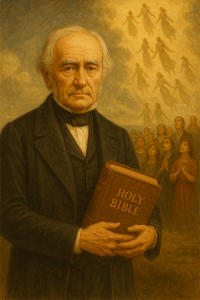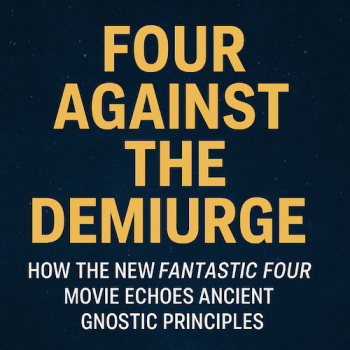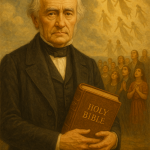
“The rapture is the theological equivalent of waiting for your dad to come back with cigarettes.”
~ Some honest Christian who finally cracked a Bible and realized context exists
Let’s not play coy: the rapture ain’t happening.
Not today.
Not tomorrow.
Not when Kirk Cameron makes another sequel.
Despite the Left Behind books selling like fake Jordans at a church picnic and despite half of American evangelicalism doomscrolling CNN like it’s a live countdown to Armageddon, the cold truth is this: the rapture isn’t biblical. It isn’t historical. It’s fan fiction with Scofield’s footnotes scribbled in the margins.
So, gird up your loins! Here are twelve solid reasons why the rapture is the theological equivalent of a Jenga tower made of wet cardboard—and why believing in it doesn’t just make you wrong, it makes you dangerous.
Dispensationalism: The Original Fanfic
The rapture crawled out of the swamp of dispensationalism—a 19th-century theological experiment cooked up by John Nelson Darby, an Anglo-Irish preacher with more time on his hands than sense. Darby thought God ran history like a bad manager scheduling shifts: a “dispensation” for Israel, one for the church, and a final, flaming dumpster fire for everyone else.
Out of this bureaucratic mess came the rapture—God’s supposed emergency exit plan for “true believers.” One problem: nobody in church history ever taught this before Darby. Not Augustine. Not Aquinas. Not even Luther on one of his beer-soaked rants.
It ain’t biblical. It’s Darbycal.
Scofield: The Guy Who Made Fanfic Canon
Darby’s wacky theories might’ve rotted in obscurity if not for C.I. Scofield—ex-lawyer, ex-Confederate soldier, and full-time Bible footnote hustler. In 1909, he dropped the Scofield Reference Bible, stuffing Darby’s ideas right into the margins of Scripture.
Evangelicals started treating Scofield’s notes like cheat codes. Soon the notes were the Bible, and entire denominations were built not on verses, but on Scofield’s commentary. The rapture didn’t become “truth” because it was revealed—it became “truth” because it was repeated.
More Schisms Than Starbucks Locations
Dispensationalism didn’t unite Christians—it turned them into apocalypse-loving factions with more timelines than a Marvel multiverse. You’ve got Pre-Trib, Mid-Trib, Post-Trib, and the “Pan-Trib” crowd who smugly say “it’ll all pan out.”
Some say only 144,000 get raptured. Some say only Baptists. Some swear Jesus is coming back to Missouri (because, of course, Missouri).
It’s not clarity. It’s chaos. Holy chaos, with charts that look like a Nicolas Cage conspiracy board. 40,000-plus denominations can’t be right.
Mainstream Theologians: “Nah, Bro”
Ask any scholar who’s cracked open more than a Chick-Tract and they’ll tell you: dispensationalism is hot garbage. Catholic, Orthodox, Protestant—hell, even Baptists who read books—reject it. Why? Because it’s built on eisegesis, not exegesis.
(Spoiler alert: All Christian theology is eisegesis, as all of it has baggage in the form of bias. More on that in a future article…)
Translation: it reads into the text what it wants, instead of reading out what’s there. That’s how you end up with whole sermons on microchips being the Mark of the Beast while ignoring Jesus saying “the kingdom of God is now.”
Dispensationalism is spiritual junk food. It tastes sweet to the gullible, but it leaves your brain malnourished and your theology constipated.
The Rapture Ain’t in the Bible (At All)
Here’s a newsflash: the word “rapture” ain’t in the Bible. Not once.
Folks cling to 1 Thessalonians 4:17—“we shall be caught up together with them in the clouds.” The Greek word harpazo means “snatched.” Latin turned it into rapiemur. And voilà! A whole eschatology was born out of a bad game of telephone.
But Paul wasn’t describing a cosmic Uber ride for the saved while everyone else burns. He was using royal imagery: when a king returns, people go out to meet him and usher him in. No evacuation, just celebration.
Revelation Ain’t a Roadmap
Revelation is not your end-times calendar. It’s not a crystal ball. It’s a resistance text written under Roman rule, dripping with metaphors, coded imagery, and first-century sass.
666? That’s Nero, not a barcode.
The Beast? Rome, not a microchip.
The Whore of Babylon? Empire (generally speaking), not the EU.
Revelation was written to comfort persecuted Christians in the 1st century, not scare suburban white folks into hoarding ammo and freeze-dried lasagna in the 21st.
Rapture Theology Fuels Christian Nationalism
And here’s where things get ugly: a lot of evangelicals don’t just believe the rapture is coming—they’re trying to speed it up.
They elect strongmen like Trump. They demonize immigrants as “signs of the end.” They block climate action because “God’s gonna burn it all anyway.” They treat Middle East wars like prophetic fireworks.
They don’t see wildfires, famine, or war as tragedies. They see them as “birth pangs.” Which means they aren’t trying to solve problems—they’re trying to fulfill prophecy.
They’re watching everything unfold like giddy schoolchildren. That’s not just delusional—it’s lethal.
Trump: The Eschatological Mascot
The cult of Trump isn’t just political—it’s religious cosplay. Many evangelicals see him as Cyrus 2.0: a fatally flawed but divinely appointed vessel to usher in the end.
Why else overlook the narcissism, the sexual assault allegations (RELEASE THE EPSTEIN LIST), the fraud, the blasphemy (“I alone can fix it”)? Because in rapture-land, character doesn’t matter. Prophetic purpose does.
Trump isn’t their candidate. He’s their wrecking ball, sent to knock over democracy so Jesus can rebuild it. That’s not faith. That’s fanfiction meets fascism.
Escapism, Not Engagement
Rapture theology gives Christians the ultimate excuse for apathy. Why care about poverty, racism, or climate change if you’re about to get beamed up like Captain Kirk?
Why fix oppression when Jesus will judge the wicked? Why reform systems when God’s gonna nuke them anyway? It’s the perfect theology for lazy Christians who want a front-row seat to destruction without lifting a finger to prevent it.
It’s nihilism with a smiley face sticker slapped on it.
If He Existed, Jesus Preached Kingdom, Not Sky Evacuation
Full disclosure: I’m a mythicist; that is, I don’t believe Jesus ever existed. However, if the Jesus of the bible existed, I’m pretty sure he’d never taught, “Hang tight, I’ll beam you up before the fireworks.” He preached, “The kingdom of God is at hand.”
As the story goes, he told us to feed the hungry, heal the sick, welcome the outcast, and love our enemies. His prayer was: “Your kingdom come, your will be done, on Earth as it is in Heaven.”
Not “Get us outta here before it gets messy.”
The biblical Jesus didn’t come to airlift you out. He ostensibly came to show how to stop, drop, shut-em-down, open up shop through humanity.
The Racist Roots of the Rapture
The rapture didn’t just sprout from some pious Sunday school musings—it’s got roots tangled up in racism like kudzu on a fencepost. When John Nelson Darby’s theological fan fiction made its way to America, it landed right in a culture still reeling from emancipation but deeply committed to keeping whiteness on top. For white evangelicals, the rapture was basically the ultimate “Irish goodbye” from history: why bother fixing racism, poverty, or Jim Crow when Jesus was going to beam you up before the whole place went to hell anyway? Nothing says “I wash my hands of systemic oppression” quite like waiting for God to play celestial Uber driver. It was an escapist theology tailor-made for folks who wanted a golden parachute from a society they broke but didn’t want to repair.
But for the oppressed—especially African Americans who had endured slavery, lynching, and the whole demonic carnival of white supremacy—the rapture took on a different flavor. If the sour here-and-now meant whips, chains, and “Whites Only” water fountains, then the sweet by-and-by promised cosmic payback with a side of streets paved in gold. Spirituals and sermons carried that underground hum of escape: sure, you’ve got me down here, boss man, but when Gabriel blows that horn, I’m first class on that one-way flight to Glory. The rapture became the great leveling field, the divine redistribution plan where the last would finally laugh loudest. The problem, of course, is that this survival theology doubled as a sedative. It gave hope, yes—but it also risked keeping folks staring at the clouds instead of flipping tables here on Earth. In short: the same theology that comforted the beaten gave cover to the beaters. Which means, in the twisted math of dispensationalism, the oppressed got a promise, and the oppressors got a pass.
Jesus, the Cosmic Fixer
One of the nastiest side effects of rapture theology is the way it marinates believers in a cocktail of bad beliefs. Chief among them is the comforting fairy tale that everything will be made right when Jesus comes back. You don’t have to bother with messy things like systemic racism, climate collapse, or poverty because, hey, Jesus is gonna show up like a divine janitor and sweep it all away. Why fix the house when the landlord is about to torch it? This belief functions like a spiritual procrastination button: don’t worry about justice now, God’s got you later. And while you’re at it, go ahead and let the world burn—after all, it just means the rapture is closer. It’s the theological equivalent of littering because you know a cleaning crew is coming tomorrow.
Worse yet, some Christians were taught that heaven includes box seats overlooking hell, where the “saints” can sip their celestial lattes while watching the damned roast for eternity. Think about that: not only does this theology normalize indifference to suffering, it celebrates it. It makes cruelty part of the reward system. If you believe heaven is a cosmic sports bar where you cheer while others fry, what does that do to your compassion here on Earth? Spoiler: it numbs it. You stop seeing humans as neighbors and start seeing them as potential entertainment in the afterlife. This bad theology gives people license to act like jerks, vote like tyrants, and shrug off suffering because—ta-da!—“they’ll get what’s coming to them” when the trumpets blow. In short, the belief that Jesus will fix everything later becomes a hall pass for doing nothing (or worse) now. It breeds apathy, arrogance, and sometimes outright cruelty, all wrapped in the smug packaging of “God’s will.”
Final Thoughts: Stop Looking Up, Start Waking Up
If God really were the God of love that church folks keep bragging about, then the rapture would make Him look less like a loving Father and more like a cosmic deadbeat dad who takes some of the kids to Disneyland while locking the rest in the basement with a rabid raccoon. You can’t sell John 3:16 out of one side of your mouth (“God so loved the world…”) and then turn around and pitch “But He hates most of y’all, so buckle up for plagues and brimstone.” That’s not love—that’s divine Hunger Games. A God who supposedly “is love” but leaves most of humanity behind for a celestial torture-fest isn’t loving; He’s running a Saw sequel in the sky.
And Christians who strut around calling themselves “ambassadors of love” while secretly rooting for the rapture? Please. That’s like claiming you’re a humanitarian while praying for a zombie apocalypse just so you can watch from the rooftop with popcorn. How can you honestly grin about people being “left behind” to suffer torment, death, or worse, while you’re polishing your harp in the clouds? That’s not compassion; that’s smug self-preservation wrapped in Bible verses. True love runs into the burning building to save folks—not stands outside gleefully pointing at the flames yelling, “Told ya so!” If your idea of good news is you escape and everyone else gets roasted, congratulations: you’re not an ambassador of love, you’re an ambassador of assholery.
The rapture ain’t happening—and thank God, the Universe, or the Flying Spaghetti Monster. Because if you quit staring at the sky waiting for cosmic rescue and start giving a damn about your neighbor, you’ll realize Jesus (if he existed) wasn’t preaching escapism. He was preaching transformation.
Dispensationalism has given us broken theology, fractured churches, toxic politics, and an entire subculture of Christians obsessed with prophecy charts while ignoring poverty, sickness, and injustice.
It’s time to rapture ourselves out of this nonsense and into radical love, fierce justice, and some good old-fashioned common sense.
Let the sky fall.
Let the kingdoms rise.
But let the truth endure.
Do you believe in a rapture? Why? Share your thoughts in the comments below!
Further Reading & Sources
- John Nelson Darby – Synopsis of the Books of the Bible
- I. Scofield – Scofield Reference Bible (1909)
- Barbara Rossing – The Rapture Exposed: The Message of Hope in the Book of Revelation
- T. Wright – Surprised by Hope
- Diana Butler Bass – Christianity After Religion
- Craig C. Hill – In God’s Time: The Bible and the Future
- Peter Enns – The Bible Tells Me So
- Michael Gorman – Reading Revelation Responsibly
Derrick Day is the author of Deconstructing Religion, Deconstructing Religion 2, The Martial Leader, MetaSpeech, and the host of The Forward Podcast.
Follow him on Facebook, Instagram, TikTok, and YouTube














